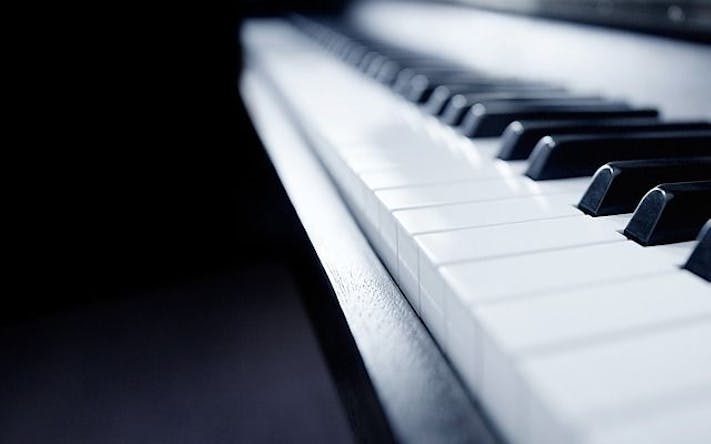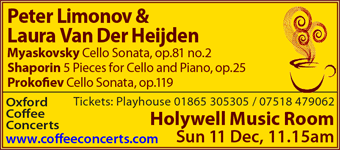A sunny Sunday morning on Holywell St, with the last bloom on the Fremontodendron, soggy from the day before's drenching rain, peeping in at one of the east windows, saw an out-of-the-way programme of little-heard Russian music played by pianist Peter Limonov and cellist Laura van Heijden. Sergei Prokofiev, of course, requires neither explanation nor introduction, but Nikolai Myaskovski and Yuri Shaporin? Not names to trip off the concertgoer's tongue. Both are 20th century composers and both had their middle years in the Stalinist era when regime pressure of the great purges of the 1930s and then the Zhdanov Doctrine inspired the post-war crack-down on music, criticizing "formalistic distortions and anti-democratic tendencies" (ie, in musical terms, no dissonance permitted in new music).
Myaskovski's Cello Sonata No. 2 is a late work written in 1948-49 and Myaskovski, doubtless wanting to keep his head down and out of sight of the cultural purge, writes this as bit of a throwback to the lyrical tonality of the late 19th century Romantics. As expected, given the work's dedication to cellist Mstislav Rostropovich, the cello predominates throughout, and Ms van Heijden, in turquoise and black, produced a smoothly flowing tone in the first two movements, the second one ending in her plucking delicately at the strings almost like a harpist. The piano does come forward a bit in the Allegro con spirito, and Mr Limonov, all in black, drove an energising tempo with little pointilliste figures.
The five brief parts of Shaporin's Five Pieces for Cello and Piano were also written for Rostropovich, this time in 1956. The Valse (waltz) was notable, the relaxed dance rhythm coming mainly from the piano. I imagined Russian émigrés from the Tsarist regime listening to this music in their Parisian parlours and drawing rooms, reflecting bitterly upon past glory. In the 3rd part, Ms van Heijden squeezed out a few birdsong notes at the very top of the register. In the next part, the music became denser and both players modulated their volume perfectly to allow the other instrument to speak clearly. The maturity of Ms van Heidjen's playing, given that she's a first year student at Cambridge, is very striking.
Prokoviev's Sonata for Cello and Piano formed the third leg of the trilogy, and our musicians told me afterwards that this was the core piece they wanted to play together, and then chose the two other works in the programme with which to surround it. They have known each other for a couple of years, have played duets on many occasions since, and are to record today's programme in January. I found in it little hint that it was written in the 20th century, and this from a contemporary of Bartók and Stravinsky. Our soloists made of it a fine showpiece, extracting from it a full measure of sentiment and, as occasionally necessary in the finale, bravura. Mr Limonov is a delight to watch at the piano.





